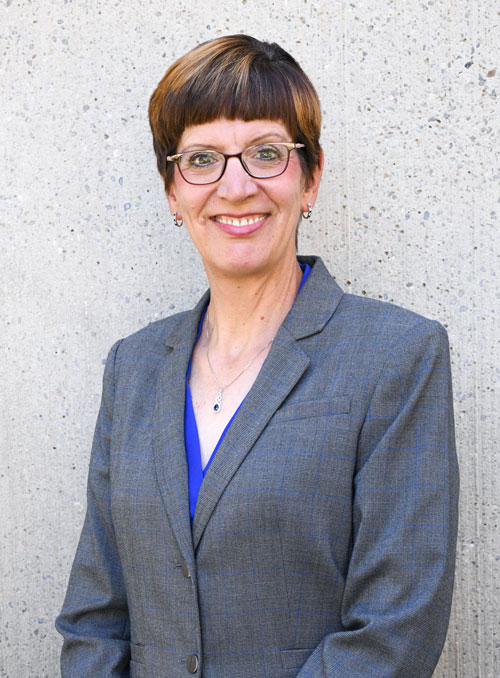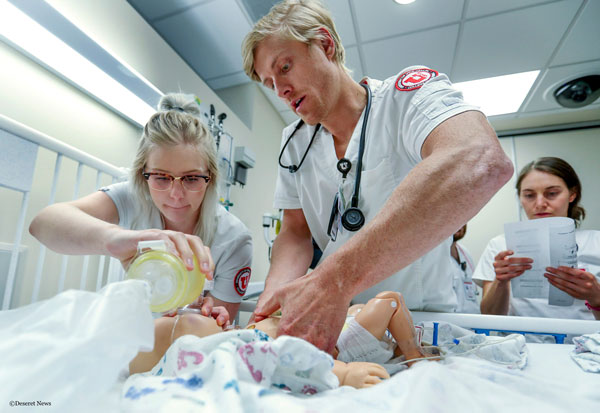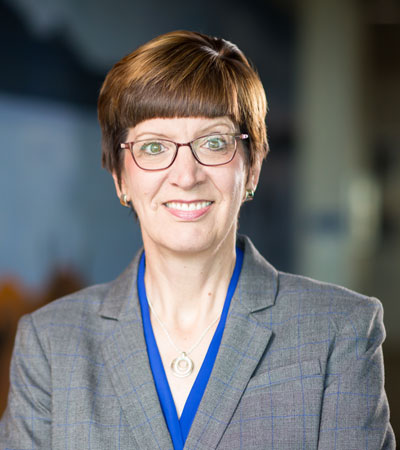Voices of U of U Health
From Air Force Colonel to Dean
When a new leader assumes her role, people naturally want to learn more about that person and what makes her tick. I’m grateful for this opportunity to offer a glimpse into who I am, what I value, my leadership style, and future priorities for the College of Nursing.
This is an extraordinary time to be stepping into my new role as the eighth dean of the College. I appreciate the great work that interim dean Barbara Wilson, PhD, RN, accomplished during the last two years and look forward to building on the College’s strong foundation in the years ahead.
Leadership and Service

I’ve been a professor and chair of Acute and Chronic Care in the College since 2017. Before that, I spent nearly 29 years in the United States Air Force, serving in a variety of clinical, leadership, research, and academic roles. In the military, leadership is a given. Military officers are expected to lead. I enjoy working with teams and leading initiatives that make an impactful and meaningful difference for good.
Throughout my career, I have had research, academic, and leadership experiences in disparate settings that prepared me to serve as Dean. I repeatedly crafted a compelling vision for areas of responsibility, led and/or managed key initiatives, launched policy, faced varied challenges, inspired others to act with confidence and integrity, and achieved goals through united efforts. These opportunities required leadership that was confident and humble, inclusive yet efficient, and decisive but committed to evidence-based re-evaluation.
The College of Nursing has special strengths such as, but not limited to, dedicated faculty and staff; interdisciplinary programs of study; excellent facilities and technology to foster learning; robust clinical practices with state-wide reach; the Emma Eccles Jones Nursing Research Center; a T32 Interdisciplinary Training in Cancer, Caregiving, and End-of-Life Care; research innovation teams; the Hartford Center of Geriatric Nursing Excellence; nine endowed chairs; and committed alumni and members of the Dean’s Advancement Board. Given these strengths, it’s a perfect time to reflect on our mission and the remarkable opportunity that we have to reach new heights.
College-Level Strategy Refresh
One of my top priorities as dean is to lead strategy refresh work. Embracing One U, we will ensure strong alignment with U of U Health and the University of Utah strategies, while considering our history, the nature of nursing and gerontology academia and practice, and the changing landscape of health care. As “refresh” suggests, we’re not putting the brakes on things we do well. But we will not necessarily continue business as usual. For instance, we have a strong foundation of clinical practice in behavioral health, bereavement care, primary care, midwifery, and women’s health. I want to build on these strengths, developing new academic-practice partnerships and expanding health services to underserved communities.
Faculty governance and input are critical to the refresh process. Dictating the agenda from the top down will not work. Rather, I look forward to inclusive and transparent discussions in which faculty, staff, students, alumni, and other stakeholders generate ideas and unite around a common set of goals, priorities, and accountabilities.
Culture of Inclusion
Cultivating an academic culture of belonging where everyone can thrive is vital. The College of Nursing is interdisciplinary, which creates unique opportunities for collaboration and sets us apart from some nursing schools. Faculty are nurse, gerontologist, scientist, social worker, public health, and statistician professionals. Staff who support faculty have expertise in academic disciplines such as public administration, business administration, accounting, education, and public health.
As a college, we will work to dismantle systemic racism and enhance diversity, equity, and inclusion. If we don’t make this a priority, our education, research, academic practice partnerships, and community engagement will never be all that they could be. In a world where racial violence, bias, and health disparities exist, we must prepare our graduates to create a culture of health; provide accessible and equitable care for all patients; develop equitable health policy; and improve the health of individuals, families, and communities.
It’s especially important that the nursing workforce reflects our diverse society. We will focus on recruiting, retaining, and promoting or graduating faculty, staff, and students from underrepresented groups. I will continue to lead a Health Resources and Services Administration-funded project to improve diversity within the nursing workforce. We will also implement a holistic admission process for graduate and doctoral students, award scholarships, partner with Black organizations, and weave content about racism, social determinants of health, social justice, and health equity into our didactic and clinical curriculum.
Advancing Research
As part of a public research university and world-class academic health care system, the College of Nursing is uniquely positioned for distinction in nurse-led interdisciplinary team science. The research mission at the College of Nursing has grown tremendously in recent years, and we intend to leverage that momentum. Interdisciplinary partnerships will be essential in taking our research to the next level. This includes partnering with scientists, local and state agencies, private and nonprofit organizations, and the federal government. We also have room to strengthen application of research and other evidence to clinical practice within U of U Health and with partners like Primary Children’s Hospital.
Our nursing faculty are incredibly productive. They outperform many peer institutions in terms of grant applications submitted, grant awards, peer-reviewed publications, and presentations. We are currently ranked No. 27 for National Institutes of Health (NIH) funding. In the future, I believe we are capable of being among the top 10.
As we continue to generate and disseminate science that answers clinically important questions and fills existing knowledge gaps, we will cement our place among the best nursing schools in the country.
Responsive to Students and Communities
Given a projected worldwide shortfall of nine million nurses and midwives by 2030, the College of Nursing is doing its part to educate the next generation of nurses. Faculty deliver high-quality education while staying atop national trends regarding topics such as learning preferences of students, learning technologies, and competency assessment.

This year we launched one of the few dual Doctor of Nursing Practice-PhD programs in the nation, enabling us to prepare students for a dual role in research and advanced clinical practice in primary care. Our strengths in curriculum development, interprofessional education, synchronous and asynchronous online instruction, and simulation have made it possible to continue educating students during the coronavirus pandemic.
Students will benefit from the College having increased presence in the community. Numerous opportunities exist for us to improve the health of Utahns. Expanding access to health care in rural and medically underserved communities, addressing public health topics like air quality and opioid misuse and addiction, fostering healthy aging, supporting caregivers, and focusing on mental wellness are only a few of them.
I am humbled and honored to serve as dean. Guided by values of selfless service, humility, diligence, courage, commitment, inclusion, respect, and integrity, I am doing my very best to lead the College and partner with interdisciplinary colleagues and stakeholders to prepare future nurses, gerontologists, and health care leaders to improve the health and care of individuals, families, and communities within Utah and the nation. I look forward to all that we will accomplish as educators, scientists, and clinicians in the years to come.
